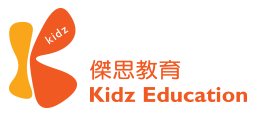傑思教室 / Tenses & Proofreading Elite
Topic 38: 'stop'
1. Stop to watch television!
2. Stop watching television!
以上哪句是「不要再看電視了!」的英文?
(1)的意思是停止做某些事情而去看電視 'Stop (doing something) to watch television!'
(2) 的意思才是不要再看電視,千萬別用錯呀!

https://www.kidz.com.hk/…/produ…/tenses-proofreading-elite-6
Topic 32: Everyone is / are ready?
Subject-verb agreement
跟 'someone', 'no one', 'something' 等一樣,'everyone' 也是跟單動詞 (singular verb) 的。所以,正確答案是:
Everyone is ready.
那下面的答案又是什麼?
Everyone is ready. Please take him / her / them out.
'Everyone' 沒有標明性別,所以一般我們會用 'them'。 正確的用法如下:
1. Everyone is ready. Please take them out.
2. Everyone is wearing a cap. They look smart.
3. Everyone looks smart.

https://www.kidz.com.hk/…/produ…/tenses-proofreading-elite-6
Topic 28: Subject-verb agreement (2)
Fill in the blanks with 'like' or 'likes':
1. My father, as well as my mother, ___ me.
2. My sisters, like my mother, ___ me.
'As well as' 及 'like' 等視乎第一個主語是複數或單數:
4. 第一個主語是 'my father' ,所以用 'likes'
5. 第一個主語是 'my sisters',所以用 'like'
還有更多例子,可見於以下系列,或於傑思英語教室再談 ![]() :)
:)

https://www.kidz.com.hk/…/produ…/tenses-proofreading-elite-6

https://www.kidz.com.hk/…/…/prepositions-and-tenses-weekly-5
https://www.kidz.com.hk/…/…/prepositions-and-tenses-weekly-6
Topic 27: Subject-verb agreement
Fill in the blanks with 'is' or 'are':
1. Someone ___ here.
2. Either of them ___ here.
3. Neither of them ___ here.
4. Both of them ___ here.
1, 2: 'Someone', 'nobody' , 'either', 'each' (Singular subject 單數主語)等後用 'is' (Singular verb 單數動詞)
3: 'Neither': 書面及正式英語 (formal writing) 用 單數動詞 ,即 'is',非正式寫作及口語可用 'are'
4: 'Both' (Plural subject 複數主語)用 'are' (Plural verb 複數動詞)
還有更多例子,可見於以下系列,或於傑思英語教室再談 ![]() :)
:)

https://www.kidz.com.hk/…/produ…/tenses-proofreading-elite-6

https://www.kidz.com.hk/…/…/prepositions-and-tenses-weekly-5

https://www.kidz.com.hk/…/…/prepositions-and-tenses-weekly-6
Topic 26: be and not be
1. Tony ___ (not like) desserts.
2. Tony ___ (not be) naughty.
很多學生看到此類題目就怕怕,其實只要記住提示中沒有"be" 時就用 "do/does/did" 等,有"be" 時就用"is/am/are/was/were" 等 verbs "to be" 已可。
另一做法是可着學生嘗試先把以上句子讀作實証句 (positive statements): Tony likes desserts./Tony is naughty. 那改作否定句 (negative statements)時就是 : Tony does not like desserts./Tony is not naughty. (答案)

https://www.kidz.com.hk/…/produ…/tenses-proofreading-elite-3
Topic 23: So much? So many?
"There is so much housework to do!"
因為 "housework" 是不可數名詞,所以我們會用 "so much/a little",
以下列出了部分常用的不可數名詞:
homework housework paper money furniture jewellery rubbish litter
Topic 7: in/on the bus?
以下哪一句正確?
1. I am in the bus.
2. I am on the bus.
究竟 ' in' 和 'on' 分別適用於哪些交通工具呢?
其實我們大致用可站立和不可站立來分類:
可站立的用 'on', 不可站立的用 'in'
如:
on: the bus/the train/the ferry/the plane/the cable car
in: the car/the taxi/the van
至於車站,則一律用 'at',如:
at: the bus stop/the taxi stand/the airport/the MTR station。
相關書目 Related series:

https://www.kidz.com.hk/…/produ…/tenses-proofreading-elite-2

https://www.kidz.com.hk/…/…/prepositions-and-tenses-weekly-2
Topic 4: 如何教小朋友記英文不規則動詞的過去式? (Part 3)(the past tense of the irregular verbs)
有些小朋友會把"thank"當作是"think"的過去式,如果記住了以下的規則,以後便不會弄錯了!
規則三:-ought/-aught
在這個組別的不規則動詞大概如下:
buy --> bought
bring --> brought
think --> thought
fight --> fought
seek --> sought*(seek --> sought 在高小的練習才出現)
teach --> taught
catch --> caught
小二升小三的小朋友,趁著暑假可以開始以這個易記易學的方法慢慢學習過去式;小三以上的小朋友,也可當作重温呀!
相關書目 Related series:

https://www.kidz.com.hk/…/…/prepositions-and-tenses-weekly-3

https://www.kidz.com.hk/…/grammar…/products/grammar-weekly-3

https://www.kidz.com.hk/…/produ…/tenses-proofreading-elite-3

